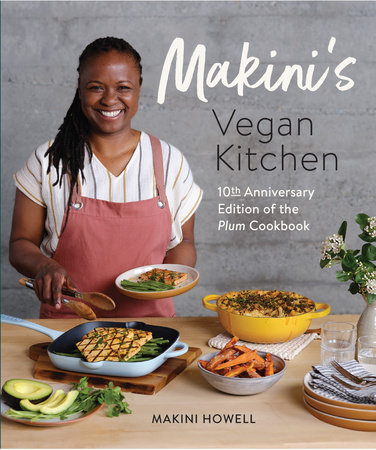Introduction
IT'S BEEN A MINUTE. In the decade since I published this book so much of life has happened. I still very much appreciate the art of food, and Plum Bistro has become all that I imagined it would be. We continue to tell a beautiful story of entrepreneurialism, family food, culture, and sustainability. Plum Bistro’s journey has led me to
Makini’s Vegan Kitchen, which was originally published in hardcover as
Plum a decade ago. It is a venture of the heart. Makini’s Kitchen has now expanded into a vegan lifestyle brand with a tofu factory here in Georgetown, Seattle, manufacturing a tasty line of tofus in such flavors as Baba’s Mesquite Tofu, Baba’s Jerk Tofu, Baba’s Tofustrami, Baba’s Taco Mix. You can order these in person or online for the recipes that call for them or start your own plant-based traditions.
I started this brand to honor my dad, who the angels carried home in early 2021. To say my father’s death was crushing does not come close to describing my feelings of loss. I did not want him to be forgotten; in fact, I want everyone to know how truly good of a man he was. My father (we called him Baba) taught me how to cook and he created all of the delicious and exciting flavors of our tofu we use in the restaurant so I decided to share the goodness in his name.
A Plum Bistro cookbook came about through popular demand. So many of our customers ask how we do it, and oftentimes they’re asking for more than just our recipes. Plum Bistro is about giving veganism a new definition, incorporating my generation’s work ethics, beliefs, and style into what we do. We want our love of a plant-based diet to embody the change we’re all going to meet in the coming years with regard to how we harvest food and how we treat our host planet.
Plum’s food is honest and personal. It tells my story as a lifelong vegan, and it’s made and served by a group of people who love the space they’re in. They love preparing our food, as well as being a part of a small but influential community.
My intention with this book is to create a complete culinary experience. When I was in New York, even living in Brooklyn I was frustrated by the lack of vegan options. Eating out almost always meant having a salad. Although we do offer salads, at Plum there are no limits on being vegan. Instead, we like to think of what we do as an expansion—for me, vegan food is about flavor first. My recipes are shaped by traditions such as butter sauces, chimichurri dressing, and handmade pastas. I also use classic grilling techniques for everything from pizzas to vegetables. I’m really not trying to replace anything because I don’t feel—and I’ve never felt—like I’m “missing” anything. I’m just using other sources of protein. What you’ll find in these pages is a vegan reinterpretation of modern, smart, thoughtful food. You can cook our recipes easily at home, and we have a wide enough variety that you can revel in our dishes at every meal.
Our bistro reflects this same idea. When you step into Plum, whether you’re a vegan or not, you won’t miss a thing. Our food covers every meal and mood: we have a brunch menu, featuring Tiramisu Pancakes (page 18) and Good Old-Fashioned French Toast Stuffed with Strawberries and Sweet Soy Cream (page 17), among other treats. Happy-hour regulars line up for sage-infused gin-lemon cocktails served with our gourmet fries and dips and grilled pizzas. Families enjoy dinners of Hazelnut Tofu and Tempeh with Millet and Blueberry Salad (page 75), along with Spicy Peach Tofu and Tempeh with Charred Purple Beans (page 67). We’ve worked hard to expand the definition of what makes for a gratifying, innovative meal. Besides offering gluten- and nut-free dishes, we also have something called a transitional raw section on our menu. We want to be able to feed almost anyone.
This idea of changing the way you taste pushes us to experiment and recraft, to look at our dishes from outside the box and try to make them even tastier, more indulgent, and more vibrant. We unapologetically incorporate bold colors and spices to speak loudly to your culinary experience. One of our great passions is to draw on the simple traditions of American food to stir your palate and emotions. We are bright, daring, and sophisticated, and through our promise to do no harm to our animal neighbors, we peacefully extend to you all the bounty and beauty of the earth.
Our focus is to support local small and family-owned farms by using 90 percent regionally grown foods. Sometimes we use bananas, sure, and they don’t grow in the Northwest, but we try to be conscious of when we’re using foods from outside our region and why. We’re also a 100 percent organic company.
This all-encompassing mindset comes naturally to me, because it’s how I was raised. I was lucky enough to grow up completely vegan and organic with two entrepreneurial, truly progressive parents. My father, James Howell, inherited a grocery store that grew over the years into a family of restaurants, giving my siblings and me a business that has been in our family for years. And my folks fed us a completely plant-based diet that gave me the blueprint for Plum, for this book, and for the expansion of our green, sustainable, plant-based business.
In the 1980s, when the idea of a diet free of animal products was almost unheard of in the United States, my mother, Niombi, cut a swath through the natural food industry by demanding organics from all our purveyors. Long before “locavorism” was a concept, she deliberately developed relationships with certified organic tofu and tempeh companies within 360 miles of her businesses. She taught us how to farm in a backyard pea patch, and my folks created sauces and seasoning mixes that would be the foundation for a new way of experiencing the plant world.
My mother then created a tofu sandwich and a millet burrito—something completely unheard of at the time—and launched her sandwich company, Hillside Quickies vegan sandwiches. Her product line has been in every major co-op in the Seattle/Tacoma/Olympia area. She laid the blueprint for the vegan sandwich, all while home-schooling and raising three mindful, vegan, organic kids.
I think of what we do at Plum as being a bridge, a space to create community. In fact, the name Plum represents a gathering space for all. It was inspired by the role of the plum tree in Japanese culture, where it symbolizes hope and community, constancy and kindness, the triumph of good over hardship. My hope was to create all of this in the restaurant, and I’m grateful to offer a place to celebrate and support all these values, whether I’m cooking on the line or greeting guests at the door.
Makini's Vegan Kitchen, formerly
Plum, was born from my fortunate upbringing by vegan entrepreneurs—two people who had a vision of the future of food. The recipes here are just the beginning of my story. It’s my sincere hope that this book not only builds on what my parents began, but that it also brings your newly vegan daughter, your gourmet son, and your skeptical in-laws—your whole family—to the table to celebrate
your story.
Copyright © 2023 by Howell, Makini. All rights reserved. No part of this excerpt may be reproduced or reprinted without permission in writing from the publisher.





















